
Rare Community Profiles is a Patient Worthy article series of long-form interviews featuring various stakeholders in the rare disease community, such as patients, their families, advocates, scientists, and more.
The Urgent Need for a Cure for Niemann-Pick Type C: Two Parents Share Their Perspectives
Over the past decade, researchers have explored investigational treatments like arimoclomol and adrabetadex as potential treatment interventions for Niemann-Pick disease type C (NPC). Yet the resulting understanding of the impact of these drugs has been complex at best.
In 2021, Mallinckrodt Pharmaceuticals shared that their analysis of a clinical study showed no clear evidence of the potential benefit of adrabetadex in NPC1, leading to the conclusion of the development program. The FDA, at the time, declined to look at long-term outcomes of children using adrabetadex when compared to natural history data.
Arimoclomol has had similar issues, with its New Drug Application (NDA) being shot down by the FDA, who did not believe that clinical data has proven its benefit and requested additional data for drug approval (although Zevra Therapeutics shared that the FDA has accepted a re-submitted NDA for arimoclomol, with a PDUFA date of September 21, 2024).
Throughout this process, parents of children with NPC have tirelessly fought for FDA support, offering their own insights into the positive impact of arimoclomol or adrabetadex on their own children. Patients and parents are important stakeholders and should be considered in facilitating drug development for NPC. While there have been some avenues for parents to provide insight, there are also many cases where their voices have been excluded. More so, many children remain excluded from compassionate use or Early Access Programs.
During my time at Rare Disease Week, I met two parents, Garland Alvey and Christine Petty, whose children were diagnosed with NPC. While their trajectories are different—Garland’s daughter Abby has access to treatment, while Christine’s son Ryan does not—their mission is the same: to get treatments across the finish line, gain access for NPC families across the country, and encourage developers to work towards a cure.
In their discussion with Patient Worthy, Garland and Christine discuss the profound impact of NPC on their lives, the need to fight institutional inertia, and why families with NPC need help sooner rather than later.
What is Niemann-Pick Disease type C (NPC)?
Niemann-Pick disease consists of a group of rare, fatal, and inherited metabolic conditions. These are broken down into types A, B, and C. NPC is caused by NPC1 or NPC2 gene mutations. This ultra-rare lysosomal storage disorder prevents cells from metabolizing cholesterol and lipids (fats). These lipids and cholesterol build up in cells, causing cell death.
Niemann-pick disease type C is a variable condition. For some individuals, it occurs perinatally or in early infancy. Others experience late-onset diagnosis, for which neurological and psychiatric symptoms are more common. Regardless of the form, people with NPC often experience significant diagnostic delays. For Christine’s son Ryan, the diagnostic delay was around 3-4 years. She explains:
“We’ve determined that Ryan’s age of neurological onset was around four to five years old, but he wasn’t diagnosed until he was eight. Looking back, there were signs for many years, but the signs of NPC can be easily confused with other disorders. It wasn’t until he started having difficult-to-control seizures that we pursued genetic testing, which came back with NPC.”
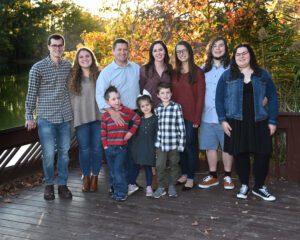
Garland’s daughter Abby also experienced a multi-year diagnostic delay. At just two weeks old, Abby began to suddenly bruise. Both Garland and his wife, Abby’s mom, have experience as healthcare professionals. Immediately concerned, they rushed Abby to the emergency room where she was transferred to a higher level of care. Doctors believed that Abby had biliary atresia. Says Garland:
“Many children with NPC are often first diagnosed with biliary atresia or another liver or spleen disorder. Sometimes they do transplants before realizing. After months of working her up for biliary atresia, the doctors were almost insistent on surgery but we just felt like something wasn’t right.”
After getting a second opinion at a hospital, where Abby was observed until four months old, Garland and his wife were told that whatever happened with her liver was idiopathic. As Abby continued to develop—“fat and happy,” as Garland says—the parents’ concern fell. Abby loved dancing, playing with her dolls, and playing with her friends and family. But around three years old, she stopped being able to keep up. Her speech became harder to understand; she was suddenly clumsy.
The family continued to seek out local support from specialists and were told at almost every turn that everything was ok and that she was just slow to develop and was clumsy. After a serious episode of ataxia, or collapsing from excitement, the parents insisted on genetic testing. A test that covered several lysosomal storage diseases, including NP-AB and others, was administered. Excluded from that test was NPC. With more questions than answers from local specialists, and at the urging and support of her pediatrician, Abby’s parents decided to go back to the same out-of-state hospital that helped with ruling out biliary atresia. There they finally received the worst news. A diagnosis of NPC would need to be verified with a genetic test, but they were told she had it and it was terminal. On Abby’s fourth birthday, the test came back: she had NPC:
“They told us to go home and make memories because there was nothing we could do.”
The metabolic genetics team would go on to connect the family with the lead Niemann-Pick Disease researcher at NIH. The family was also steered by other NPC parents to reach out to the principal investigator of adrabetadex and they enrolled Abby after careful consideration.
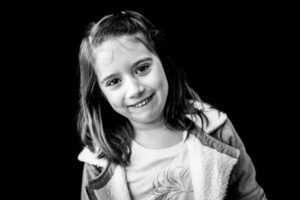
Identifying NPC Symptoms
Both Abby and Ryan experienced different symptoms; as Christine mentioned, symptoms from NPC can be varied, making it difficult to diagnose. Potential symptoms of NPC may include:
- An enlarged spleen and/or liver (hepatosplenomegaly)
- Slurred speech
- Difficulty swallowing (dysphagia)
- Abnormal bile flow (cholestasis)
- Hearing loss
- Jaundice (yellowing of the skin, eyes, and mucous membranes)
- Low muscle tone (hypotonia)
- Clumsiness
- Failure to thrive
- Fetal ascites (abnormal abdominal fluid accumulation)
One of the key characteristics of NPC that was present in both Abby and Ryan is called vertical gaze palsy. This refers to an inability to move the eyes vertically. Christine notes:
“Ryan has had vertical supranuclear gaze palsy for a while. You’ll see his head bobble because he has to physically move his head to look at certain things.”
Garland follows up:
“I’ve learned that vertical gaze palsy is the biggest tell that doctors can pick up on to go down the road of a lysosomal storage disease.”
As NPC progresses, it becomes a form of childhood dementia. Garland and Christine explain that these children often require 1:1 care 24 hours a day:
“They can’t eat alone or walk alone, because there’s a risk of them escaping. Essentially, NPC leads to all the risks of an elderly person with dementia but it’s a child. That’s why we need to fight for these therapies to maintain skills.”
Medical Gaslighting
Medical gaslighting occurs when a physician dismisses someone’s symptoms, denies that someone is ill, or asks questions to caregivers or patients that suggest that their lived experience is invalid or wrong. Unfortunately, medical gaslighting is extremely common in the rare disease space. While the phrase “when you hear hoofbeats, think of horses, not zebras,” is still commonly used in physician training, there needs to be broader physician education to recognize the prevalence of rare diseases. Over 300 million people worldwide live with a rare disease. To best serve these individuals and their families, physicians must combat medical gaslighting and create an environment where physicians and families can work hand-in-hand towards solutions.
For Garland, medical gaslighting was most present when the initial hospital attempted to tell his family that Abby had a completely different diagnosis, or that her symptoms were typical for developing children. He ponders:
“If we had listened when they said there was nothing wrong, where would we be today?”
For Christine, medical gaslighting has been very difficult on her and her husband. She explains:
“I’m from a dual military family. My husband was constantly deployed and I’m a service member as well. Our family is our number one priority. For a long time, I blamed myself when he wasn’t making milestones. I look back and see that he had so many signs. If I had just known to ask, if I had just believed in myself more…as a parent, it’s hard that you can’t change the past. And it’s hard to think about the trust we sometimes put into physicians where we’re told that there isn’t anything to worry about. Because I now see there were exit points where we could have gotten an earlier diagnosis. It keeps me up at night.”
In a sense, the failure to advance adrabetadex and arimoclomol almost seems like its own form of medical gaslighting. While the importance of regulatory control over drug development is paramount, the voices of families who have been helped by these medicines have been consistently denied entrance into the regulatory space. If families feel like they have nowhere to go or that their lived experience isn’t being included in considerations, how do they maintain hope?
The Fight for Treatment Access
Unfortunately, NPC is considered a fatal disease. No FDA-approved treatments exist. While adrabetadex and arimoclomol have been shown to both improve quality-of-life and halt disease progression, many families do not have access to these therapies.
Christine & Ryan
For Christine’s son Ryan, the access issues stem from his disease manifestation and age at diagnosis. They are currently pursuing expanded access for Ryan to receive necessary treatment. She shares:
“Right now, we can hold on to hope but it’s hard. There is a lot of institutional inertia. With rare diseases and the consequences, it’s important for drug developers and regulatory agencies to have flexibility and a sense that, if untreated, these diseases will rob you of your life. Ryan is such a sweet boy. He loves life. But it has been devastating to know that this disease will take away his ability to think, walk, and talk. Ultimately, he will die from this unless a cure is developed in time to save his life.”
Right now, Ryan is bright, bubbly, and has a zest for life. Before he visited the NIH, he had a dream of becoming the Supreme World Ruler—and for a great reason: so he could assign video games for homework every night. Now he hopes to become a doctor growing up.
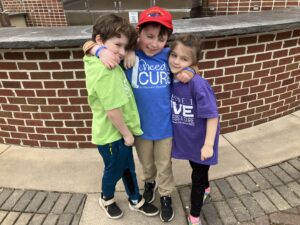
Christine remains amazed by his positivity and magnanimity in the face of challenges, which makes the obstacles that they go through even more tough. It can be hard to advocate and fight for access when the family is navigating specialty appointments, fighting for IEPs, and managing emergency seizures. Says Christine:
“One seizure in the middle of the night was non-responsive to rescue medicine. His seizures make his dysphagia, coughing, and choking worse. With school, the education system is not set up to serve our children. Just like the medical system, it is reactive rather than proactive. Reactive is not good enough for these children. It’s heartbreaking. We want to do everything we can to protect him, but these bureaucratic barriers don’t make sense to me. I want the FDA to know how important drug access and development are for our kids. Progression is regression. With every moment we don’t move forward, these kids lose skills that they won’t get back. There needs to be a ‘rare sense’ of thinking when it comes to drug development and access for rare disease.”
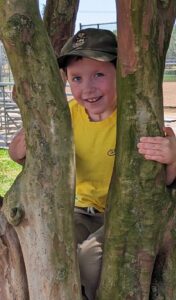
Garland & Abby
Because Abby was diagnosed when she was four years old, Garland and his wife immediately jumped into research on clinical trials. Abby was accepted and began adrabetadex treatment. Says Garland:
“Once she got diagnosed, she fought. She’s such a fighter. She went every two weeks to Chicago during the pandemic to get her medication, spinal injection, and lumbar puncture. She was so proud to get the meds without anesthesia and would tell everyone, ‘I’m strong. I’m strong.’”
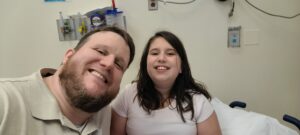
Four years into treatment, Abby is now treated in Washington, D.C.; she has had over 110 injections. Her strength has never wavered, and Abby, under the guise of Abby Strong, has even transformed into a superhero wearing a vibrant purple cape.
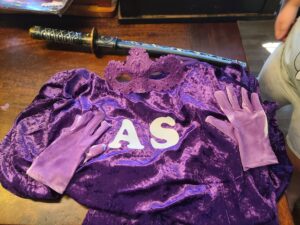
While Garland and his wife are incredibly thankful for Abby’s treatment access, they still recognize and deal with the challenges faced by the NPC community. One challenge is the impact on families and the parental relationship. Says Garland:
“These diagnoses can destroy a family. Sometimes your family doesn’t react well and people don’t support you like you thought. Everyone doesn’t always pull together immediately and that’s ok. And with autosomal recessive diseases like this, mom and dad have the genes. So you think about the history of your marriage and how there’s a 25% chance that every child you have can have a rare disease, there are complex layers of emotions and guilt. It can really rock your relationship. My wife and I had super dark days at first, but we pulled through it tremendously to be stronger than ever. I think many parents of newly-diagnosed children could benefit from knowing that they’re not alone in those feelings.”
While Garland has spoken with and around Abby about NPC, he isn’t sure that she can cognitively grasp what is happening. The family is currently fighting for an assistive device to help her communicate, though the school system is fighting them. The system isn’t built to support progressive neurodegenerative diseases in children. As they wade through these uncertain waters, Abby’s parents must also deal with the grief that comes with an NPC diagnosis. Garland shares:
“It’s a sad blessing to have an actual diagnosis. We were lucky to have only had a 4 year diagnostic odyssey. And the grief process is huge. Our grief path resets constantly. We grieve, then feel guilty when feeling relief. NPC parents are also dealing with anticipatory grief. I think there needs to be more research into anticipatory grief and its effects, as well as how to cope with it. I want to think about and talk with her about who she is going to marry and what job she is going to love doing without the burn of knowing these kids, with age of onset like her, don’t make it past 20, with over half dying before age 10.”
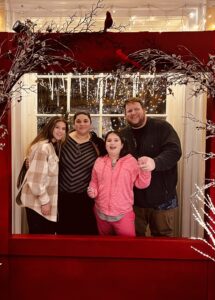
It’s this grief, this desire to overcome it, the love for his daughter, and the desire to make a change that push Garland towards advocacy. Lysosomal storage diseases across the board are facing access issues and problems getting medications across the finish line. Says Garland:
“We’re spending a lot of time trying to get approval. Companies can’t keep doing these long-term trials where the solution is having children die in a control group. We’ve heard from the FDA that if we want this to work, we have to make sacrifices. But why should we make sacrifices with our children’s lives?”
In preparation for the upcoming PDUFA meeting, the National Niemann-Pick Disease Foundation put out a community response to the FDA review of arimoclomol. If your family is impacted by NPC and you would like to add your voice to the conversation, please reach out to the NNPDF to see how you can get involved.






